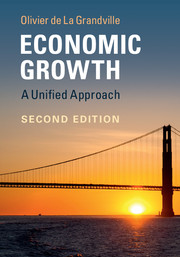Book contents
- Frontmatter
- Dedication
- Contents
- Foreword
- Preface to the second edition
- Introduction to the first edition
- PART I POSITIVE GROWTH THEORY
- PART II OPTIMAL GROWTH THEORY
- PART III A UNIFIED APPROACH
- In conclusion: on the convergence of ideas and values through civilizations
- Further reading, data on growth and references
- Index
Foreword
Published online by Cambridge University Press: 01 December 2016
- Frontmatter
- Dedication
- Contents
- Foreword
- Preface to the second edition
- Introduction to the first edition
- PART I POSITIVE GROWTH THEORY
- PART II OPTIMAL GROWTH THEORY
- PART III A UNIFIED APPROACH
- In conclusion: on the convergence of ideas and values through civilizations
- Further reading, data on growth and references
- Index
Summary
There are several different directions from which one can approach the theory of economic growth, even with a fairly strict definition of “theory”. The theory can help to account for particular historical episodes: Europe after the War, China after the reforms, for example. More particularly, the theory may help to codify, though not explain, the story of technological progress. Alternatively it can be used to try to understand the effects, on inequality, say, of social and economic institutions and their changes. Or, in still other hands, it can serve as a vehicle for an abstract picture of a whole economy. Each of these angles could give rise to a different sort of book.
Olivier de La Grandville's remarkable text is not any of those. It is, of course, a careful and clear exposition of the theory itself, with a transparent proof of everything that needs proving. Yes, but a reader is struck – at least this reader was struck – by the number of tables and graphs that amount to numerical experiments. They depict in great detail the consequences for the message of the theory of choosing different values for the main parameters. The book is written in the spirit of a master model-builder: it tells you how to do it, and why to do it. And interestingly, the text is more self-contained than the usual: for example, some central results in the calculus of variations are derived from economic first principles. And why not? Economic logic is also logic.
This instinct of calculation (I intend the echo of Veblen's “instinct of workmanship”) is a useful habit of thought. It is always comforting to build a model from first principles, using assumptions that one learned in school and that have become internalized. Then the model can just be left to do whatever it does. Olivier de La Grandville (and I) think that this is not such a good idea. Sometimes what seems intuitively inevitable seems that way only because it is customary. Trying out alternative parameter-values is a good way to discover whether a model actually gives sensible results. Peculiar results may be a warning that some traditional assumptions may not be so reasonable, or not any more.
- Type
- Chapter
- Information
- Economic GrowthA Unified Approach, pp. xiii - xivPublisher: Cambridge University PressPrint publication year: 2016



